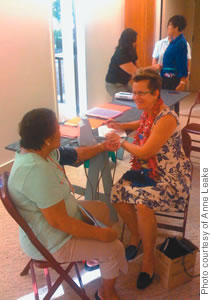
Preventing Type 2 Diabetes
November 05, 2008
By Anne Leake, PhD, APRN-Rx, FNP


Anne Leake, PhD, APRN-Rx, FNP
Assistant Professor at UH-Manoa School of Nursing and Dental Hygiene
Interviewed by Melissa Moniz
Can you talk about the upcoming “The Health Is Wealth/Kalusugan Ay Kayaman” event, and also about your involvement?
This is a research study about diabetes, so I am the principal investigator in partnership with the Filipino Nurses Association of Hawaii. I have been affiliated with them for the last eight years and we’ve done one study already, which was a survey of parts of the Filipino community concerning what sort of research they were interested in. So we didn’t pick the topic of diabetes out of the air or what we thought was most important. Preventing Type 2 diabetes in adults was the overwhelming favorite they selected as research priority. This study is starting up in result of that study, and it’s funded by the National Institute for Nursing Research. At the School of Nursing here, we have a center called the Ohana Self Management For Chronic Illness. The reason the “ohana” is in there is, among our Asian and Pacific Islander cultures, the importance of family is supreme. In the Western world, we talk about self-management and how we take care of ourselves, but for Filipinos it’s about yourself in the context of your family. So this study is funded through that center. It’s a small grant because it’s a pilot study. What it’s specifically studying is whether scheduling lifestyle intervention on the weekends in an outdoor setting would do anything to help improve our retention. There’s basic information people need to know, but not everyone is going out to get it. So we’re testing whether flexible scheduling will increase the chances they will get the content we’re trying to teach them. And so the event is a diabetes prevention project. Really, we know from surveys that native Hawaiians, Filipinos and Japanese are our top ethnic groups for prevalence of diabetes. But just because you have the genes doesn’t mean you’ll get diabetes, and that’s really the positive message. People can do something about it - so basically it’s avoiding weight gain and staying active.

|
So all day Saturday (Nov. 8, 15, 22, 29) we’ll be out at Blaisdell Park from 9 a.m. to 3 p.m. We’re having multiple offerings for each of the lessons and let people set their own goals. So what we’re doing is promoting self-management. We’re also going to measure people and check them to make sure that they don’t already have diabetes. If they do, we’ll refer them for care.
What is the connection between Type 2 diabetes and certain ethnic groups?
Well, the theory is there is a thrifty gene, which was very helpful if you lived on an island and there were periods of famine. So your thrifty gene will really hold on to your calories in periods of feast and save them for periods when there is famine. The problem is we don’t have famines anymore, so some of us have genes that were very protective centuries ago, but aren’t good in the modern age. So that’s one theory.
What is Type 2 diabetes?
It’s initially a problem of having enough insulin, but the insulin is not working well. So the cells in our body are working against our own insulin. We call that insulin resistance. This is what is most amenable to diet and exercise. This stage is very treatable with diet and exercise, but it’s a progressive disease. It starts out with insulin resistance, but then after a period of time the pancreas stops making as much insulin as it used to. So then we go to other kinds of drugs - pills that stimulate the pancreas. But after a few years, then there often is the need for insulin because the pancreas just can’t keep up. And later there’s damage, such as to the eyes and kidneys. So getting screened early is very important.
During annual checkups, do physicians normally check for diabetes?
Yes, usually yes. In Hawaii with our large percentage of Asians and Pacific Islanders we usually start regular screenings at about age 35. It’s a little bit younger than other ethnic groups. At least that’s what we recommend.
You mentioned earlier about prevention. Can you talk a little more about diet and how that translates to diabetes prevention?
The main thing about diet is making sure you’re not eating more calories than you need. There’s no proof that says the certain kinds of foods cause diabetes. So eating candy doesn’t cause diabetes. It’s just getting too many calories.
Besides attending the Health Is Wealth event, where else can someone go to get more information and to be tested?
I think the best place to call is the American Diabetes Association. It has done a very good job, and lately it has been partnering with churches and asking churches if they’d like people to come and do blood pressure and blood sugar screenings. Just having high blood pressure increases the odds of you having diabetes. So that’s why we usually screen for both things when we do health fairs. I think, for people who are not insured, the community health centers throughout the state offer it at low cost. And there’s another event coming up in on Nov. 14 (11 a.m.-1 p.m.). It’s World Diabetes Day, and they are having an awareness event at Tamarind Park at Bishop Square.